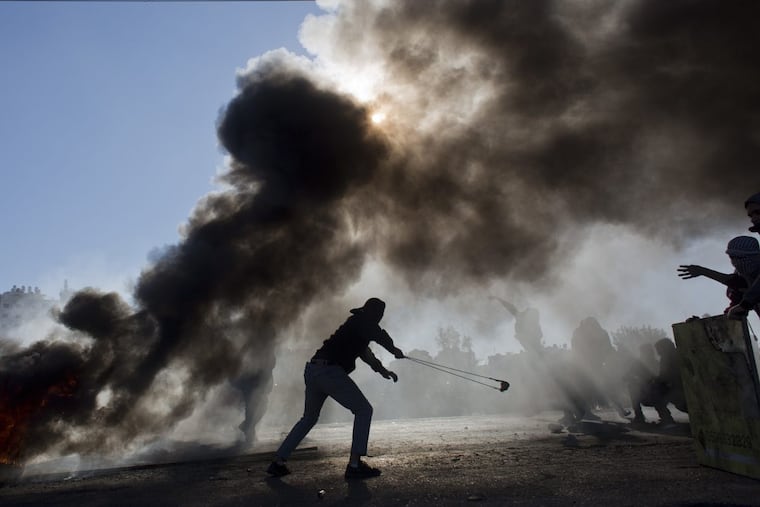I'm heading for Jerusalem to see impact of Trump | Trudy Rubin
I'll be talking with Israelis and Palestinians about whether Trump's Jerusalem bombshell finally ended the moribund peace process - and what comes after.

I'm heading for Jerusalem to see whether President Trump has just galvanized an Israeli-Palestinian peace process, as he claims — or put the final nail in its coffin.
Actually, I had planned this trip before Trump's decision to recognize Jerusalem (including annexed Arab neighborhoods and the contested Old City) as Israel's capital.
My original intent had been to check out whether there was any there there to the eight-month-long effort by First-son-in-law Jared Kushner and Trump lawyer pal David Greenblatt to devise a new peace plan. After all, the president has been bragging that he wants to do the "ultimate deal" that will produce Israeli-Palestinian peace.
It was nearly impossible to believe the novice team of Kushner-Greenblatt would work miracles. With the Mideast in chaos, and Palestinian leadership weak and divided, not to mention an Israeli government that disdains a two-state solution, there seemed little chance of reviving peace talks.
But Trump's move made clear that White House efforts are aimed more at preserving the status quo than creating a breakthrough. The president made no reference to Palestinian claims on Arab parts of the city or their expectations that their capital, too, would be in part of Jerusalem. In effect, although he issued a demurrer, he was endorsing the Israeli position that all of Jerusalem will remain entirely under Israeli control, removing the United States from any role as honest broker.
Without the concept of a shared Jerusalem there can be no viable peace plan. Full stop.
So the air has been cleared. The time has come to look at what it will mean for Israel to permanently rule over a disenfranchised Palestinian population in the West Bank, Gaza, and East Jerusalem. That Arab population, combined with Israeli Arabs, will soon outnumber Israeli Jews in the land between the Jordan River and the Mediterranean. If it doesn't already.
This is the subject of the hour among many Israelis and certainly among Palestinians after Trump's speech.
I will be talking to right-wing Israeli politicians and Jewish settlers who want their government to annex most of the West Bank, confining disenfranchised Palestinians to disconnected cantons.
I will also be talking to Palestinians and some Israelis who feel the time has come for a one-state solution with equal voting rights for all. (This may sound normal to Americans, but in one geographical space where two communities have been at bitter odds with each other for over a century, that would be a formula for constant civil war; this is why Israeli leaders like the late Prime Minister Yitzhak Rabin believed separation into two states was the only option.)
I will be traveling to the West Bank to ask Palestinian politicians and young people whether the end of the peace process will spark another violent uprising, or lead to a nonviolent campaign to label Israel as another South Africa. And I will also visit Gaza, from which Israel pulled out in 2005, where the radical Hamas movement, temporarily tamed, could resume firing rockets into Israel. What to do about Gaza, with its two million Palestinians who face a severe humanitarian crisis, is a conundrum that no leader, Israeli or Arab, wants to deal with.
I will be asking if anyone on either side has any new ideas on how to solve this most intractable dilemma. Federation, confederation, local autonomy, Jordan is Palestine — over the years all these formulas have been broached and none found viable.
And finally I will test the thesis that Israeli leaders and Trump seem to be betting on: that the Palestinians will swallow whatever they are offered. The reason: Sunni Arab countries that once backed them are now more focused on the threat from Iran than they are on the Palestinian cause.
Does this mean dejected Palestinians will accept self-rule over disconnected West Bank cantons bereft of Jerusalem? I will be asking.
One thing is certain: The end of the peace process can't be divorced from the changes in the region. The Iranian threat has grown on Israel's northern border. Iran-backed Shiite militias inside Syria are now within a handful of miles of Israel's Golan Heights border, even as Jerusalem sends bombers over Syria to strike at nascent Iranian bases. And Hezbollah, backed by Iran, has thousands of missiles pointed at Israel on the Lebanese side of the border.
I will travel to the Golan, from which one can look into Syria and see hostile militias — and from where desperate Syrians cross into no-man's-land to seek treatment from Israeli doctors.
I will be asking Israeli civilian and military sources whether war with Iran is likely on the country's northern frontier. Understandably, this is where Israel's attention is focused.
Yet absent a peace process, the Palestinian question will continue to fester within Greater Israel, and may in the long run present a greater threat than Tehran. One state or two? Hot war with Iran (that could drag in the United States) or cold war on the Lebanese-Syrian border? Those are the questions I intend to explore.
If you have other questions please send them to trubin@phillynews.com and I will try to ask them as well. And please follow me as I document my trip on Twitter and Facebook.